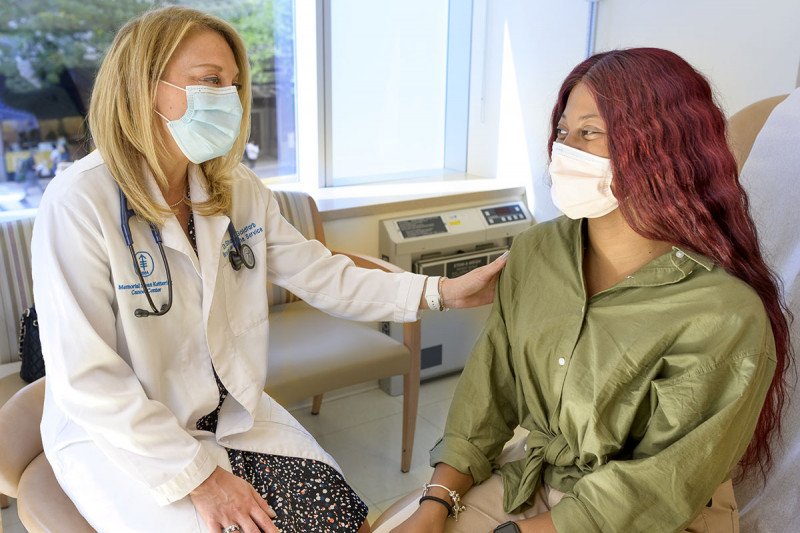
In recognition of Breast Cancer Awareness Month, Memorial Sloan Kettering Cancer Center (MSK) shared four stories about new developments and advances in breast cancer prevention, research and treatment being conducted by MSK clinicians and researchers.
The COVID-19 pandemic led to a significant drop in breast cancer screenings, which detect the disease early and improve a patient’s chances of survival. In fact, a June 2021 CDC study found that the number of cancer screening tests women received through the CDC’s National Breast and Cervical Cancer Early Detection Program declined by 87% during April 2020 compared with the previous five-year averages for that month. It’s now more important than ever to resume annual breast screenings and other necessary medical appointments.
To emphasize the importance of screenings and increase awareness about the risk of breast cancer, MSK shared the following updates.
When Breast Cancer Strikes Before Age 45
In response to data showing breast cancer becoming more common among women under the age of 45, MSK created a program to support younger women fighting the disease. Co-founded by Mary Gemignani, MD, PHD, Director of the Breast Surgical Fellowship Training Program, and medical oncologist Shari Goldfarb, the program focuses on the unique and often unmet needs of women in this age group who are diagnosed with breast cancer.
“No one is ever prepared when they are diagnosed with cancer,” said Dr. Gemignani. “But it’s particularly difficult when a woman is diagnosed with breast cancer in their 20s, 30s, or 40s. This program aims to address the unique challenges of young women that are often not experienced by older patients.”
The program helps patients deal with the impact of breast cancer therapies on sexual health and fertility issues as cancer treatments like chemotherapy, radiation and surgery can affect fertility.
Inflammatory Breast Cancer
Inflammatory breast cancer (IBC) is a rare type of cancer that accounts for only one to five percent of all breast cancers. Yet despite its low occurrence, it’s very important that women know how to identify it, as symptoms of IBC can develop rapidly and can manifest themselves differently than the lumps most women typically know to search for.
“In IBC, symptoms often cause the breast to become red, swollen and inflamed, with thickened or discolored breast skin with tiny dimples, puckers or ridges that make it look like an orange peel,” said Dr. Audree Tadros, MD, MPH, FACS, Jeanne A. Petrek Junior Faculty Chair and member of MSK’s IBC team. “While the symptoms may look like an infection, the real culprit is cancer that is blocking lymphatic vessels in the skin and breast tissue.”
The IBC team at MSK consists of Dr. Tadros, Dr. Jacqueline Bromberg and Dr. Amy Xu, who are studying this disease to better understand it, with a focus on reducing local recurrence rates among inflammatory breast cancer patients who were treated with chemotherapy, surgery and radiation therapy.
Breast Cancer and Intermittent Fasting
Research has shown that obesity increases a woman’s risk of developing breast cancer, and that higher fat composition in the body can spur the development and growth of breast cancer. Therefore, weight-loss strategies like intermittent fasting, which can reduce fat and improve insulin levels, may in turn help lower estrogen levels and slow the growth of breast tumors.
In recent years, cancer researchers have begun to evaluate the effects of different eating patterns. Dr. Neil Iyengar, MD, a medical oncologist at MSK, is one of those researchers. Through pre-clinical research, Dr. Iyengar is studying the link between metabolic health and breast cancer. “We’re trying to determine whether intermittent fasting can improve metabolic health and potentially reduce the risk that breast cancer will recur after treatment,” said Dr. Iyengar. “Until more research is completed to determine whether intermittent fasting or another dietary approach can reduce the risk of breast cancer, it’s important to maintain a healthy weight, including healthy body fat levels.”
Breast Implant Health for Women Who’ve Had Reconstruction
Some people with breast implants may have a very low risk of developing a kind of cancer called breast implant–associated anaplastic large cell lymphoma, or BIA-ALCL. While BIA-ALCL is indeed a rare form of cancer, internet misinformation about breast implants, coupled with a recent recall of textured implants, has raised concerns from women about how breast implants can impact their health.
“To combat all the conflicting information on breast health, MSK is working to cut through the noise and deliver the facts to women on this issue,” said Dr. Colleen McCarthy, a breast reconstruction surgeon at MSK, and a world authority on this subject. “We’re working with women to educate them on the many options they have when it comes to reconstruction and we’re conducting clinical research to evaluate women’s perceptions of their quality of life after surgery.”



